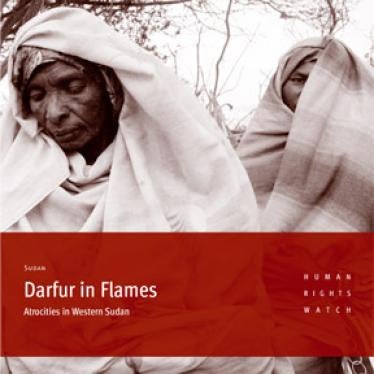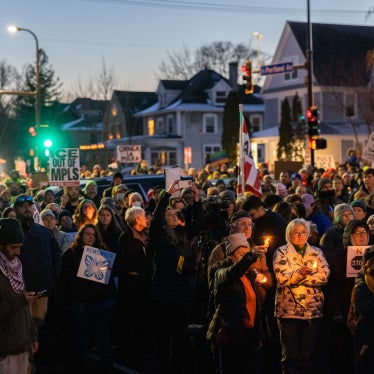Just when Sudan's bloody, yearlong campaign of ethnic cleansing in the Darfur region was exposed, the United Nations' top human rights body was convening its annual session in Geneva.
In Darfur, a region of western Sudan the size of France, a million people have already been displaced, while thousands have been killed. Khartoum-sponsored Arab militias on horseback and camel, known as "janjaweed," are pursuing a deliberate, ethnically motivated strategy forcibly to displace and kill civilians who are from the same black African groups as rebel forces demanding autonomy.
Working together with government troops, the militias are conducting brutal raids, burning villages, raping women, executing large numbers of civilians, and forcing survivors to flee—including 100,000 refugees who have fled to neighboring Chad. A 45-day "humanitarian" cease-fire was announced on April 11, but according to Human Rights Watch research this month in Darfur, it is a cease-fire in name only, as the ethnic cleansing continues.
Unfortunately, the world's press has mostly neglected Darfur, helping to give Khartoum unwitnessed permission to terrorize segments of its own population. Sudan hosted Osama bin Laden from 1990 to 1996 and is a prime example of how states that are havens for international terror also spawn it at home.
In Sudan—surrounded by Egypt, Ethiopia, Eritrea, Kenya, Uganda, Congo, the Central African Republic, Libya, Chad, and the Red Sea—the Islamic government in Khartoum is in league with nomadic Arabs who launch brutal attacks against black Muslims and black non-Muslims with impunity.
Americans are better acquainted with Khartoum's bloody 20-year campaign against the largely Christian and animist African population in southern Sudan, a conflict that featured slavery and drew Arab militias from neighboring states.
In the south, the Bush administration's tough, targeted diplomacy—led by the former senator from Missouri, John Danforth, with President Bush's direct imprimatur—has paid off. The American government has helped to broker peace negotiations in the South. Because of a cease-fire, war-time abuses have largely stopped.
America can and should play a similar forceful role to end the killing in western Sudan. As recently as April 7, the U.N. and many world leaders marked the 10th anniversary of the Rwanda genocide with pledges of "never again." In 1994, at least a half million Tutsi, along with Hutu who refused to join in the massacres, were killed in Rwanda in three months.
Like Darfur, Rwanda was then little known outside of Africa. Conveniently enough, Rwanda at the time occupied one of the rotating non-permanent seats on the U.N. Security Council, and was therefore effective at shielding itself from U.N. action that might have slowed or stopped the killing. Today, Sudan is likewise stringing the U.N. along as the killing continues.
Despite the fact that U.N. Secretary-General Kofi Annan recently drew parallels between the situation before the Rwandan genocide and the current bloodshed in Darfur, Sudan initially blocked, then delayed, a U.N. mission to study evidence of atrocities in Darfur. In the process, Khartoum bought time to continue its ethnic cleansing campaign.
In sharp contrast to the U.N., America has played an important role in spotlighting the crisis in Sudan, calling for an emergency session of the Commission on Human Rights to hold Khartoum to account for what has happened in Darfur. "We must stand up and be strong, condemning unconscionable acts," said Ambassador Richard Williamson, head of the American delegation to the human rights commission. "The U.N. Commission on Human Rights dare not fail to act."
But the UN's top human rights body managed not to act. On Friday, Sudan escaped U.N. censure with barely a slap on the wrist, rather than the harsh denunciation it deserved. The commission voted to express "concern" about the situation in Darfur, stopping short of a formal condemnation.
Increasingly, the commission has turned into a club of human rights abusers, and Sudan's presence on the body helped guarantee its escape of censure. Governments that have joined the U.N. Human Rights Commission in recent years include Algeria, Libya, Sudan, Syria, China, Cuba, and Zimbabwe.
The world's worst rights abusers wrangle seats on the commission in order to avoid censure, precisely as Sudan has done. European Union governments played a particularly perfidious role this year, helping to kill a last-minute effort to censure Sudan.
African governments, which should be most appalled at the bloodshed on their continent, often work as a bloc to oppose scrutiny of any human rights situation in Africa. U.N. bureaucrats did their own part to crush condemnation of Sudan: In advance of the Sudan vote, the acting U.N. High Commissioner for Human Rights, Bertrand Ramcharan, sought to suppress his own investigators' devastating report. The report describes Khartoum's "reign of terror" in Darfur and tells of rape, torture, and burning of villages. Only some strategic leaking by Western governments got the information into the public domain.
Sudan's foreign minister, Mustafa Osman Ismail, naturally was elated at the result of the vote. He hailed the U.N. decision's not to condemn his government, saying Thank God, we won" the commission vote even as he admitted, "The government may have turned a blind eye toward the militias. This is true." As one might expect, Sudanese officials flatly deny they are responsible for ethnic cleansing or collective extermination. Now the baton is passed to the U.N. Security Council, which could take up the killings in Sudan as early as next week.
Meanwhile, Sudan and its brutal militias are still looking to buy more time to kill in Darfur. Thanks to the U.N. Commission on Human Rights and its member countries' willingness to look the other way in Sudan, "never again" is looking like "once again" in Africa.








